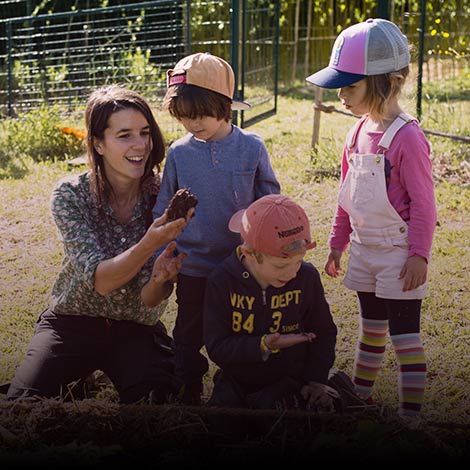Pages
The Cap au Vert program – vacations for everyone
The Cap au Vert program – vacations for everyone
Too many children who are seriously ill, have a chronic disease, or have a disability never go on vacation. How can they gain access to sports, laughter and games, like everyone else? Since 1994, Fondation de France has been supporting adapted holidays for these children in vacation centers.
A welcome break from the anxiety of illness
Many young people with illnesses or disabilities have specific needs that make it impossible to leave their family home.
Every year, the Cap au Vert (Next Stop: Nature) program funds specially adapted sports camps with specific medical support. Activities include sports like climbing, archery, hiking and skiing. These camps welcome both able-bodied children and youngsters with illnesses or disabilities. Children are integrated into activities according to their abilities, and everyone shares the magic moments of everyday life.
Thanks to this program, young people suffering from serious diseases in remission, like cancer, or chronic illnesses like diabetes or cystic fibrosis, or living with disabilities can:
- overcome their limitations, see themselves differently and show their parents and friends what they are capable of;
- develop more independence in managing their illness on a daily basis, in a welcoming, safe environment with medical support;
- change the way people view serious illness and foster the acceptance of differences.
Fondation de France has established a partnership with UCPA (a French non-profit that organizes holidays for young people), which has been providing this type of vacation package for many years. In 2020, no holidays were organized at all, due to the pandemic. In 2021, Fondation de France will support outdoor holidays for children who, on top of dealing with their disease or disability, had to endure the additional burden of lockdown and its associated health-related restrictions.
CAP AU VERT: AN ABUNDANCE OF BENEFITS
According to a survey conducted by the Fondation de France of the families of the children who participated in the program:
- 79% of families reported that the stay encouraged friendships between their children and other youngsters who did not have disabilities or illnesses;
- 91% of families said that the holiday had a positive effect on their child’s ability to deal with their illness/disability independently;
- 100% of families felt the stay strengthened their child’s self-esteem.
Contact

Call for projects
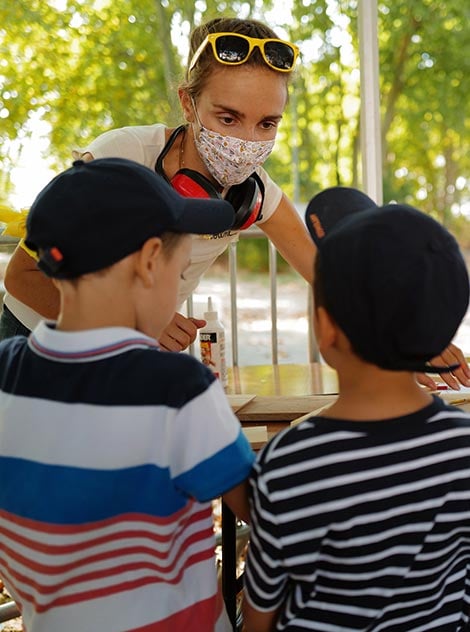
Over the last twenty years, Fondation de France has been supporting research on human cognitive and emotional development, especially that of children.
Vacations for sick children
Fondation de France offers the opportunity to take a vacation to young people in remission from serious illness, with chronic pathologies that are currently under control, or with physical or learning disabilities. The stays are organized in standard holiday centers with other children who are in good health, with the added benefit of adapted medical supervision.
Call for projects

Over the last twenty years, Fondation de France has been supporting research on human cognitive and emotional development, especially that of children.
Vacations for sick children
Fondation de France offers the opportunity to take a vacation to young people in remission from serious illness, with chronic pathologies that are currently under control, or with physical or learning disabilities. The stays are organized in standard holiday centers with other children who are in good health, with the added benefit of adapted medical supervision.
Donate to a cause close to your heart
We ensure that your gift is used in the most effective way possible in the field or fields of your choice.
The link between sport, health and social integration
The link between sport, health and social integration
As a prevention and therapeutic tool, physical activity contributes to good health. It also represents great leverage for social integration and personal development.
Fondation de France is keen to facilitate access to sport, including for young women, sick and isolated people.
Combating inequality thanks to sport
Improved cardiovascular fitness, a reduced risk of diabetes and some cancers, mental illness prevention, stress and anxiety tackled head-on, increased confidence, more social interactions, all of these things make a great score sheet for sport!
However, in terms of sport, not everyone is on the same starting line… For instance, sick people might find it difficult to travel for a sport activity – especially if they live in a rural area. Gender stereotypes are also persistent: only a third of young people who practice a sport in a club are girls. Fondation de France encourages projects that use sport to promote the social and professional integration of young women and to improve the health of sick people. There are two priorities to our work:
Vulnerable people in deprived areas
The first priority is to improve health and prevent relapses. This involves supporting regular physical activity for sick people who live in rural areas or priority action neighborhoods, as well as taking part in the regional momentum by setting up networks of different professionals.
Help for women to rebuild their lives physically and mentally
The second priority aims to help vulnerable women and girls to rebuild their lives, through sport. Physical activity bolsters women’s self-esteem, helps them accept their body and regain the confidence in their ability to take actions, which is a crucial in a successful and holistic social program. Given the impact of the pandemic on individuals, physical activity also represents the opportunity to reengage in social interaction, which has been badly dented recently.
Contact

Call for projects
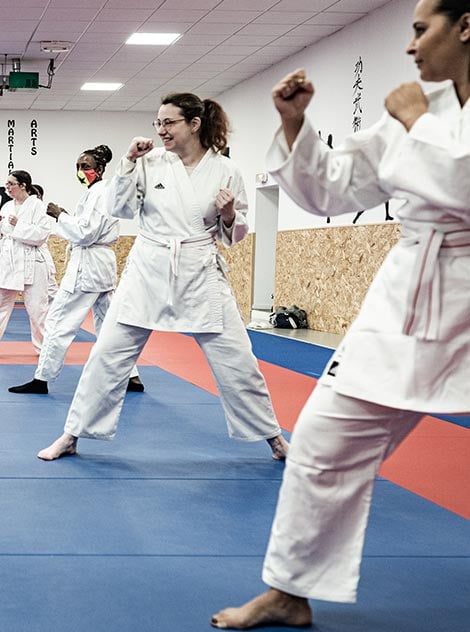
Fondation de France supports projects in France whose objective is to use physical activity and sport for women and young girls who are showing signs of vulnerability.
Women and sport, for a new start!
Incorporating physical activity or sport to help vulnerable women and young girls rebuild their lives.
Sport and healthcare in deprived areas
Creating a healthcare program incorporating physical activity and sport for patients who live in a rural area or in a priority action neighborhood.
Call for projects

Fondation de France supports projects in France whose objective is to use physical activity and sport for women and young girls who are showing signs of vulnerability.
Women and sport, for a new start!
Incorporating physical activity or sport to help vulnerable women and young girls rebuild their lives.
Sport and healthcare in deprived areas
Creating a healthcare program incorporating physical activity and sport for patients who live in a rural area or in a priority action neighborhood.
Find out more
Donate to a cause close to your heart
We ensure that your gift is used in the most effective way possible in the field or fields of your choice.
Mental health
Mental health: an inclusive, global approach supported by research
Depression, chronic anxiety, bipolar disorder, phobias, suicidal thoughts—in France, one in four people struggle with mental disorders. This situation has only worsened with the Covid-19 crisis. For over 15 years, Fondation de France has been deeply committed to mental health issues and has developed a global approach: long-term support of research on psychiatric disorders, early diagnosis, support for those concerned and their loved ones as they recover and reintegrate into society and promoting a new way of looking at these illnesses.
In September 2021, the Mental Health Convention highlighted a critical situation: growing needs, a sometimes-dramatic lack of resources to meet those needs, and the importance of making mental health a priority for public health.
Raising the stakes on research
There has been significant progress in neuroscientific research in recent years. Since 2016, Fondation de France has led an original and ambitious program that supports research on psychiatric disorders. The supported projects depend on cooperation between clinicians and researchers, with three objectives:
- identify biomarkers that make it possible to diagnose disorders more rapidly;
- improve patient management by evaluating existing therapeutic practices;
- develop new drugs for more effective treatments.
Support for people living with mental disorders means more than medical treatment. This is why Fondation de France also invests in projects dealing with their place in society.
Health issues are social issues
Mental disorders are still taboo, even if the current health crisis has encouraged debate on the subject. The misunderstanding, stigmatization, fear, denial and guilt that accompany these illnesses leads to delayed diagnosis, abuse, exclusion and infantilization. The complexity and chaos of life with a mental disorder also deeply affects families and loved ones. The Covid-19 crisis has shown how it is more urgent than ever to change the way we deal with these illnesses. We must rethink psychiatric practices to reflect a global, integrated approach to patient care that encompasses health, social and medical issues. For over 15 years, Fondation de France has been taking action to address these questions, with a strong commitment to empowering people directly affected by mental disorders and promoting the concept of recovery in France.
Fondation de France’s “Mental Disorders: access to care and daily living” program has four objectives:
- change the way people view these illnesses, to allow those concerned to better integrate into society, live their lives and support their loved ones;
- improve access to care, including training for primary caregivers, as well as ordinary citizens through mental first aid programs, and fostering the creation of mobile mental health units;
- allowing people suffering from mental disorders to better integrate into society (finding adapted housing, keeping or changing jobs, improving skills and empowering those concerned, including promoting the recovery movement and developing “peer-support”);
- supporting the entourage of the affected person (therapeutic alliances with caregivers, Profamille training, BREF program, etc.).
Changing perceptions
Among other things, Fondation de France is committed to changing perceptions and practices. It is behind the “Let’s Talk About Therapy” workshop, a large-scale public discussion in partnership with the Institut Montaigne that took place in eight French cities in 2018 and 2019. These workshops led to recommendations that were taken up during the Mental Health Convention in September 2021. Fondation de France continues these activities on a local level in the regions through “recovery workshops,” led in partnership with Santé Mentale France, a federation of medical caregivers, social workers and home carers.
In addition, Fondation de France supports projects designed for particularly vulnerable groups: young people (teens and students), the elderly, migrants who have had to cope with traumatic events and the victims of natural disasters or terror attacks.
Contact

Call for projects
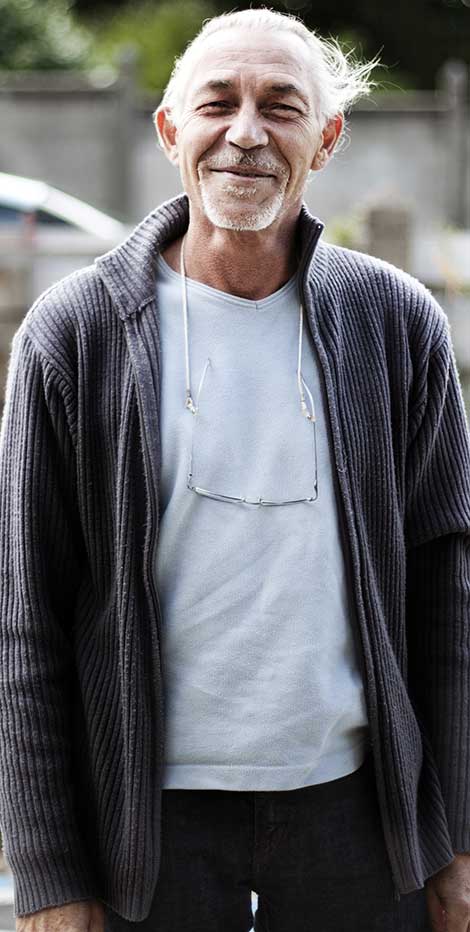
Anxiety and depression is increasing in the general population. The pandemic means that we have to act faster to change practices in psychiatry and to promote empowerment for those affected directly.
Collaborative research on psychiatric disorders
Fondation de France has decided to get involved in this domain with the goal of accelerating the uptake of new prevention methods, early diagnosis and treatments.
Mental Disorders: access to care and daily living
Fondation de France wishes to encourage the creation or dissemination of innovative projects that improve the quality of life and social integration of people living with mental disorders by fostering collaboration between the various actors who support them.
Support for migrants experiencing psychological distress
Fondation de France supports initiatives that aim to improve the psychological state of the new arrivals.
Call for projects

Anxiety and depression is increasing in the general population. The pandemic means that we have to act faster to change practices in psychiatry and to promote empowerment for those affected directly.
Collaborative research on psychiatric disorders
Fondation de France has decided to get involved in this domain with the goal of accelerating the uptake of new prevention methods, early diagnosis and treatments.
Mental Disorders: access to care and daily living
Fondation de France wishes to encourage the creation or dissemination of innovative projects that improve the quality of life and social integration of people living with mental disorders by fostering collaboration between the various actors who support them.
Support for migrants experiencing psychological distress
Fondation de France supports initiatives that aim to improve the psychological state of the new arrivals.
Find out more
Donate to a cause close to your heart
We ensure that your gift is used in the most effective way possible in the field or fields of your choice.
Research on how the environment impacts health
Research on how the environment impacts health
Research, information and prevention
The consequences of environmental changes on human health are increasingly clear. They can translate into a greater number of sometimes major disorders. In order to detect and prevent existing risks and to limit their consequences, Fondation de France supports research teams who study the impact of environmental factors on health.
There are four objectives in this program:
- identifying and studying environmental risk factors that relate to work or lifestyle;
- understanding the social determinants of disease;
- broadening the debate and informing the public of environmental impact on health;
- improving risk prevention relating to environmental factors.
Contact

Call for projects

Fondation de France contributes to change in the healthcare system by disseminating the research projects it supports, especially with policy makers. It is particularly receptive to research on treatment practices.
Public health and the environment
Fondation de France supports research on how environmental factors impact human health. Research focuses on the population as a whole, in both work-based and life-style contexts, with a view to promoting public health. It funds training for young researchers and French research teams.
Call for projects

Fondation de France contributes to change in the healthcare system by disseminating the research projects it supports, especially with policy makers. It is particularly receptive to research on treatment practices.
Public health and the environment
Fondation de France supports research on how environmental factors impact human health. Research focuses on the population as a whole, in both work-based and life-style contexts, with a view to promoting public health. It funds training for young researchers and French research teams.
Find out more
Donate to a cause close to your heart
We ensure that your gift is used in the most effective way possible in the field or fields of your choice.
International health and healthcare
International health and healthcare
The Covid-19 pandemic provided yet another opportunity to highlight the profound inequality between rich and poor countries when it comes to health information, care and treatment. Fondation de France and several of its donor-advised funds support targeted projects in the most deprived parts of the world, to reduce this inequality.
As part of its healthcare programs outside mainland France, Fondation de France has chosen to address the fight against HIV in particular. More than 38 million people in the world live with HIV, two thirds of whom live in Sub-Saharan Africa. In France, some of its overseas territories in Mayotte, the French West Indies and French Guiana are experiencing alarming situations. With its AIDS, Healthcare and Development program, Fondation de France focuses on gender equality and takes into account all gender identities to combat this disease, through prevention and care.
Prejudice accelerates epidemics
Gender inequality remains an accelerating factor of this epidemic. All too often, issues relating to contraception, screening, disclosing a serological status, following treatment and so on are still perceived as “women’s business.” In addition, heteronormativity still leads to the rejection of other sexual practices and identities (homosexual, bisexual, transgender), which further discourages the people concerned from engaging in prevention and accessing care. These factors feed into gender inequality and ultimately to the further spread of HIV/AIDS.
The Covid-19-related pandemic, especially lockdown, has increased this inequality. Now more than ever, this program responds to the health emergency by promoting the following:
- prevention of risky behavior in young people: information, access to contraception as well as talking about sexuality and consent;
- prevention of gender-based violence and care for victims;
- reinforced autonomy for women and a better understanding of their rights;
- men becoming more involved in the fight against AIDS, taking responsibility, getting screened and accessing care;
- reinforcing nonprofits’ capacity to take into account gender inequality and its impact on the epidemic.
Since 2006, more than 280 projects were funded with a total of 9 million euros.
Managing the effects of post-traumatic stress
Post-traumatic stress disorder in areas affected by severe crises (natural and industrial catastrophes, wars, etc.) is another major international health issue. Fondation de France steps up to address emergencies but it always gives priority to long-term reconstruction. This involves housing and economic activity, but it also involves people, especially young people, who often suffer from the effects of the trauma for a long time. Catastrophe response programs therefore always incorporate a mental health element. This can be educational and cultural activities to identify the children and young people most affected, help for parents in recognizing their children’s symptoms, psychological counseling, and support for nonprofit staff dealing with emergencies in the front line.
In the French West Indies, following the hurricanes that devastated Saint Martin and Saint Barthelemy, Fondation de France organized awareness raising and training programs on psycho-traumatic disorders, with the help of volunteer experts. In Lebanon, it supports among other projects a psychological counseling and support hotline, led by the nonprofit Embrace.
In addition, several Fondation de France donor-advised funds work in healthcare, especially for women, mothers and children (Fondation Maternité sans risque – a foundation for risk-free childbirth, Fondation Salins and Fondation Médecins du Monde) as well as training in humanitarian and emergency medicine (Fondation Alima for example).
Contact

Call for projects
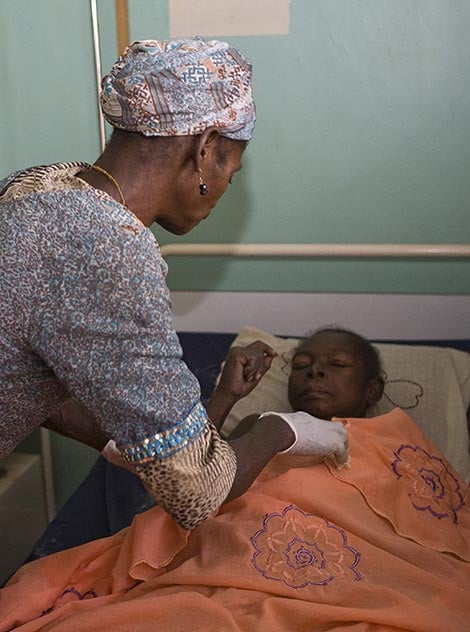
Nonprofits combating AIDS are very aware of the impact gender inequality has on the people they help. And yet, deriving practical and effective solutions from lessons learnt can still be difficult.
AIDS, healthcare and development
Fondation de France wants to support project that reduce inequality in social interactions, challenge and deconstruct representations of sexuality and status, reinforce women’s skills and autonomy, while encouraging men’s involvement in the process.
Call for projects

Nonprofits combating AIDS are very aware of the impact gender inequality has on the people they help. And yet, deriving practical and effective solutions from lessons learnt can still be difficult.
AIDS, healthcare and development
Fondation de France wants to support project that reduce inequality in social interactions, challenge and deconstruct representations of sexuality and status, reinforce women’s skills and autonomy, while encouraging men’s involvement in the process.
Donate to a cause close to your heart
We ensure that your gift is used in the most effective way possible in the field or fields of your choice.
The growing pains of teens
The growing pains of teens
The transition from child to adult is often a tricky one and can be painful. Risk-taking can be an expression of teenage angst. The priority is to identify then quickly point at-risk young people to qualified professionals. This strategy helps prevent crisis situations and treats symptoms before they become chronic.
Supporting psychologically distressed young people
“Teenage angst” can take many forms, sometimes very dangerous ones, including: eating disorders; drug, alcohol and tobacco consumption; video game addiction; withdrawal and the emergence of mental illness. For some, the added impact of lockdown and its consequences may have triggered, accelerated or reinforced these problems.
The pandemic led to social isolation, an increased feeling of loneliness, juvenile delinquency prevention programs being interrupted or no longer available and, in some cases, family tensions. All of this on top of the stress and anxiety induced by the risk of contamination… In addition, the psychosocial ripple effect is huge, including for young people who may have to bear a heavy cost in terms of early school leaving, difficulty in entering the labor market, following a training course and so on. Decompensation and completed suicides may rise, as evidenced by a modeling study published by the Australian Medical Association, which predicts an average 25%-30% increase in suicides in young people.
Despite having dipped in the past ten years, suicide still represents 16% of deaths in 15-25 year olds and the recent I-Share (Inserm) study reveals that 23% of students have had suicidal thoughts.
Generally, adolescence can represent a period of vulnerability, during which young people rarely express the need for help. Early support can often prevent a risky situation before things get worse.
In addition, young people who stick to their treatment programs, with their families involved, find it easier to achieve healing and independence.
In January 2016, our work therefore focused especially on treatment protocols so that teens, young adults and their friends and family could be identified faster and cared for better.
We have three objectives:
- reinforcing early identification of young people experiencing psychological distress and /or the emergence of mental illness;
- facilitating young people’s access to and compliance with treatment protocols [1], thanks to cross-sector partnerships;
- encouraging young people to become more independent and promoting projects that include young people and their parents, siblings, friends, etc.
[1] This is how the ARS defines treatment protocol: “the overall care pathway for patients and users in their health area (...) It requires coordinated action from prevention, healthcare, medical and social care professionals.”
Contact

Call for projects
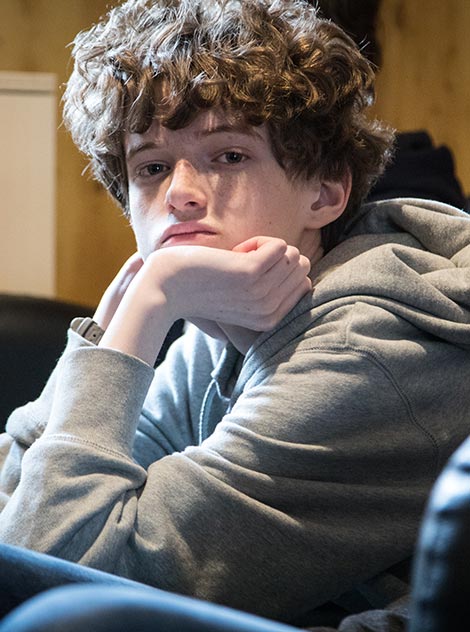
Early identification of the various disorders linked to adolescence is a major challenge, as it massively impacts the effectiveness of care protocols for patients and their families.
Supporting psychologically distressed young people
In 2021, Fondation de France will be continuing this work, by placing greater emphasis on early identification and guidance, and on the ability to benefit from treatment protocols and maintain them.
Call for projects

Early identification of the various disorders linked to adolescence is a major challenge, as it massively impacts the effectiveness of care protocols for patients and their families.
Supporting psychologically distressed young people
In 2021, Fondation de France will be continuing this work, by placing greater emphasis on early identification and guidance, and on the ability to benefit from treatment protocols and maintain them.
Find out more
Donate to a cause close to your heart
We ensure that your gift is used in the most effective way possible in the field or fields of your choice.
Science and technology, social sciences: catalysts for transformation
Science and technology, social sciences: catalysts for transformation
Fondation de France’s donor-advised funds mobilize to combine technological innovation with the public interest. Pollution control, the transition to renewable energies, intelligent transport systems—all of these are public interest issues that can benefit from science and technology. Thirteen of these donor-advised funds focus on the so-called “hard” sciences, supporting research, innovation and new academic programs, as well as addressing societal questions arising from technological development.
Equally indispensable when rising to the challenge of these complex times is research in the social sciences. The digital revolution, hyperconnectivity, job relocation, new sources of insecurity… how do we comprehend these transformations and imagine the world of tomorrow? Nineteen of Fondation de France’s donor-advised funds support research in the social sciences, not only to decipher these modern enigmas, but also to propose new ideas and practices.
Donate to a cause close to your heart
We ensure that your gift is used in the most effective way possible in the field or fields of your choice.
Displaced people
Displaced people
Welcome newcomers, support nonprofits, create lasting alliances
Armed conflicts, economic crises, climate change – the events leading to migration are devastating, and unfortunately, long-lasting. According to the office of the High Commissioner for Refugees, close to 80 million people are currently subject to forced displacement. 85% of refugees move to developing countries, the others attempt to settle in rich countries, particularly in Europe. Crossing the Mediterranean is the world’s most dangerous itinerary for migrants: since 2014, over 20,000 people have died trying to cross it, around a third of whom were children and teenagers.
In France, as in other countries around the world, nonprofits and individual citizens have mobilized to give refugees a dignified and humane welcome. Fondation de France supports their commitment.
Launched in 2015, Fondation de France’s Migrant Solidarity program aims to support projects that help exiled populations, no matter what their origins, their religion, or their legal status. Since the program started, Fondation de France has supported over a hundred projects that help migrants integrate successfully in their new countries, namely France, Lebanon and Jordan.
The projects are carried out by civil society organizations, with the support of the Fondation de France.
In France, there are two main approaches:
- offer the most fragile psychological support, as mental health is a precondition to social integration;
- support citizen actions for displaced people by offering support to nonprofits in rural areas or medium-sized towns. Volunteer training is also a priority, in particular, for teaching French and offering legal aid.
Internationally, the main goal is to give young people hope again, through psycho-social support, educational activities, training and access to the labor market.
In parallel to calls for projects, the Migrant Solidarity program assists key actors in the sector through long-term support. Some of the nonprofits that benefit from this program include Gisti, Comède, Parcours d’Exil, and the Migrant Support Platform.
Contact

Call for projects
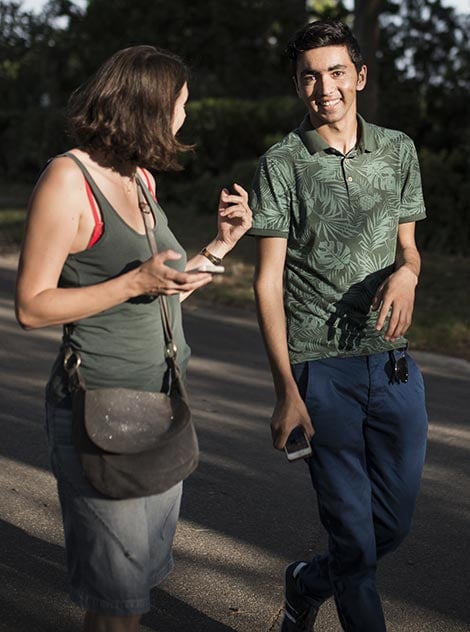
The program supports projects that focus on psychological help for the most fragile displaced people. It also assists humanitarian initiatives that involve the local population.
Support for migrants experiencing psychological distress
Fondation de France supports initiatives that aim to improve the psychological state of the new arrivals.
Encouraging local populations to engage with migrants
Fondation de France supports nonprofits based in rural areas or in cities of less than 150,000 inhabitants.
Call for projects

The program supports projects that focus on psychological help for the most fragile displaced people. It also assists humanitarian initiatives that involve the local population.
Support for migrants experiencing psychological distress
Fondation de France supports initiatives that aim to improve the psychological state of the new arrivals.
Encouraging local populations to engage with migrants
Fondation de France supports nonprofits based in rural areas or in cities of less than 150,000 inhabitants.
Find out more
Donate to a cause close to your heart
We ensure that your gift is used in the most effective way possible in the field or fields of your choice.
Elderly people, living and aging among all generations
Elderly people, living and aging among all generations
The pandemic is taking a heavy toll on the elderly. The need to protect them translated for many into increased isolation, less mobility and freedom, not to mention anxiety linked to the disease. Some of them suffered from being truly de-socialized, and from new or more severe mental health issues.
Healthcare workers and carers on the front line to protect the elderly
During the pandemic, the professionals in healthcare and medical-social institutions have had to face taking emergency decisions and address ethical issues, with no real answers, especially when dealing with deaths. At the same time, the resilience of carers looking after elderly people was severely challenged and periods of respite were very necessary.
Crisis aside, the system needs a rethink
The pandemic highlights the faults in a system that struggles to support each stage in life. The challenge is to find the right balance between safety on the one hand, social life on the other … while being mindful of every individual’s free will. Moving from “your own home” to a care home is not satisfactory. Alternative housing patterns need to be thought through to ensure that independence can be preserved, as well as social interactions in a secure environment. An overhaul of the institutions caring for elderly with fading independence is also required.
Four action themes
In order to meet these needs, Fondation de France has temporarily suspended calls for projects. That way it can adjust its work to support projects addressing the following various problems linked to the pandemic:
- the relief of mental suffering in elderly people, their families and carers;
- better support for end of life and the grieving process;
- more respite for carers and those cared for;
- the structure of tomorrow’s EHPADs (French acronym for care homes) and their alternatives.
The following call for projects, “Making choices, right to the end” and “Growing older as stakeholder and citizen” focus on current and future issues.
Contact

Find out more
Donate to a cause close to your heart
We ensure that your gift is used in the most effective way possible in the field or fields of your choice.
Heritage, a universal memory
Heritage, a universal memory
Because it testifies to our history, heritage belongs to all of us and shapes our collective identity. Preserving, promoting and passing it on means keeping it alive. It also boosts local economies and creates social interaction.
France has a wealth of ancient buildings, which boast strong heritage value... and are often in poor repair. This heritage is a privilege but it can sometimes place a heavy burden on owners and municipalities. How should we preserve this shared asset and make it accessible to everyone?
Philanthropy has always stepped up to meet these challenges. Evidence of this was the unprecedented wave of generosity following the fire that ripped through Notre-Dame de Paris. However, the scale of such events should not overshadow the work of dozens of donor-advised funds. They work daily towards heritage site restoration and contribute financial support to that end. Throughout France, they look after very old buildings, works of art and more recent industrial heritage.
Enthusiasts set up a number of these organizations, like Jean-Claude Fillaud. An art lover and deeply attached to his native Berry region, Jean-Claude Fillaud founded Dilecta in 2018. This Fondation de France donor-advised fund focuses on promoting and protecting small religious heritage items as well as rural and commemorative construction in the Indre and Vienne regions. Or like Pierre Delestre, who chose to create a foundation bearing his name via a legacy to Fondation to France, which contributes to safeguarding the Tregor chapels in Brittany.
Other foundations are led by collectives protecting an important monument, as is the case for the Fondation pour la Sauvegarde de la Collégiale de Thann (a foundation for the preservation of the Thann collegiate church), in Alsace, which was able to engage residents, sponsors and government agencies in their cause. Other examples include the Fondation pour Sarlat et le Périgord Noir (for the Périgord region) and the Fondation Internationale pour les monuments romains de Nîmes (an international foundation for the Roman monuments of Nîmes). They work towards renovating and promoting a local heritage site rich with history.
Corporate projects contribute to these activities too. The focus of Fondation Sorégies is on unprotected small-scale heritage sites and items in the Vienne department. Professional bodies are also involved, such as the Fondation France Bois Forêt Pour Notre Patrimoine (a foundation promoting carpentry for heritage preservation, while being mindful of forest resources in France), which helps restore constructions.
Landscapes, not just buildings, are also the focus of attention. Which is why the Fondation des Parcs et Jardins de France (for French parks and gardens) works to preserve, develop and raise awareness of gardens in France and promote their social, educational and therapeutic role. In the same vein, the Fondation pour Le Vésinet contributes to the renovation and embellishment of the town’s parks, lawns and lakes.
This conservation and promotion approach sometimes acquires a new dimension by incorporating social and ecological aspects to its work. The Fondation Malatier-Jacquet, a sponsor of Chambord castle and the palace of Versailles, supports several restoration projects, with the aim of combining heritage preservation, charitable projects and environmental protection.
Donate to a cause close to your heart
We ensure that your gift is used in the most effective way possible in the field or fields of your choice.


